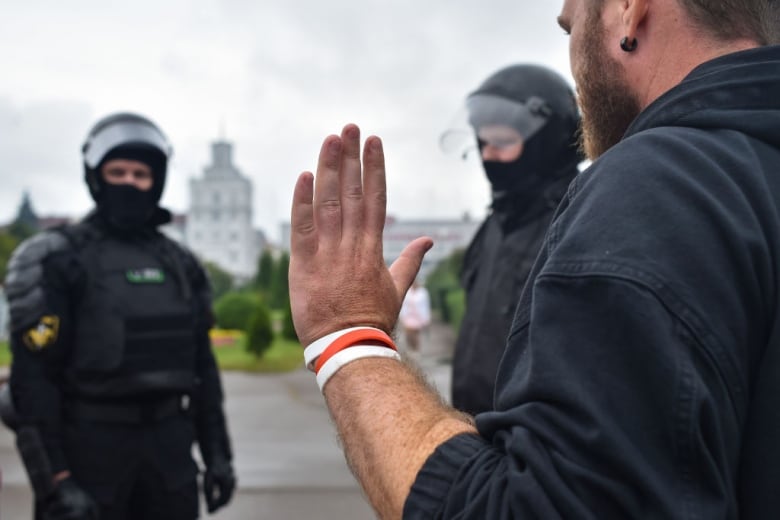Hundreds of Belarusian protesters gathered in Minsk on Wednesday evening, defying a new order from President Alexander Lukashenko, who instructed his police to clear the streets of the capital after a week and a half of rallies protesting his rule.
The European Union held an emergency summit on the crisis, rejecting Lukashenko's re-election in a disputed vote on Aug. 9 and announcing financial sanctions against officials the bloc blames for election fraud and the abuse of protesters.
"This is about the Belarusian people and their legitimate right to determine the future path of their country," EU commission head Ursula von der Leyen said. "The European Union stands at the side of the Belarusian people."
Lukashenko, a gruff former collective farm boss facing the biggest crisis of his 26 year rule, has blamed foreign countries for stirring unrest and funding protesters. At least two protesters have died and thousands have been jailed, many emerging to complain of beatings and abuse.
"There should no longer be any disorder in Minsk of any kind," he said in remarks reported by state news agency Belta, announcing the new police crackdown in the capital. "People are tired. People demand peace and quiet."
WATCH | Belarusian opposition leader Tikhanovskaya appeals to Europe:
Belarusian opposition leader Svetlana Tikhanovskaya has urged the EU to reject official results giving Lukashenko 80 per cent of the vote. A 37-year-old political novice, she stood as his main challenger in the election after better-known opposition figures were jailed or banned from standing.
"Mr. Lukashenko has lost all legitimacy in the eyes of our nation and the world," said Tsikhanouskaya in English, in a video address from exile in neighbouring Lithuania.
'We are afraid, but we come out'
By early Wednesday evening, there was no sign of a major new operation to clear demonstrators from the streets. Hundreds of protesters assembled in front of the Interior Ministry, which runs the police. A large number of officers were stationed there with vans, but they were taking no action.
People chanted "Resign!" and "Let them out!" while passing cars honked their horns in the rain.
"Of course, as a girl I am afraid," a protester who gave her name as Yulia, 28, said of demonstrating in front of the police. "I am afraid every time. But I am even more afraid that nothing will change. So we are afraid, but we come out."
Mikhail, 38, said the demonstrators had picked the spot because the Interior Ministry "took part in terrible crimes. We won't stop because it is impossible to live like this any more."
Earlier on Wednesday, police dispersed a demonstration and detained two people at the Minsk Tractor Works plant. Police also took control of the main state drama theater in Minsk, a flashpoint for protests since its director was fired for speaking out against the abuse of demonstrators.
Lukashenko ordered border controls tightened to prevent an influx of "fighters and arms," and told intelligence agencies to search for organizers of demonstrations.
Russia warns against meddling
The EU wants to avoid a repeat of violence in neighbouring Ukraine, where a pro-Moscow leader was ousted in a popular uprising six years ago, triggering a Russian military intervention and Europe's deadliest ongoing conflict.
"Belarus must find its own path, that must happen via dialogue in the country and there must be no intervention from outside," said German Chancellor Angela Merkel. She bluntly said she saw no role for herself as a mediator in the crisis, noting she had tried to phone Lukashenko, but "he refused to talk to me, which I regret."
Russia has consistently warned the West against meddling in Belarus, which has the closest economic, cultural and political ties to Moscow of all the former Soviet republics and is central to Russia's European defence strategy.
On Wednesday, Kremlin spokesperson Dmitry Peskov accused unidentified foreign powers of interfering, which he called unacceptable.

European officials say the situation differs from Ukraine in 2014, not least because the Belarus opposition does not seek to loosen ties with Russia, only to get rid of Lukashenko.
"Belarus is not Europe," EU Industry Commissioner Thierry Breton said, comparing it to pro-Western Ukraine and Georgia, both targets of Russian military operations. "Belarus is really strongly connected with Russia and the majority of the population is favourable to close links with Russia."
But some European officials, especially in countries close to the frontier, have pushed for a firmer line to support the opposition and push back if Moscow backs any move to crush it.
The Kremlin faces two choices: Stick with Lukashenko to see if he can cling to power, or try to manage a transition to a new leader who would keep Minsk in Moscow's orbit.
Flight tracking data showed a Russian government plane used in the past by the FSB security service flew to Belarus and back overnight.
tinyurlis.gdu.nuclck.ruulvis.netshrtco.detny.im
مقالات مشابه
- بازیگر Jussie Smollett, چهره شش اتهامات جدید از دروغ گفتن به پلیس شیکاگو
- خطرناک فانتزی سرنگونی تهمت رژیم
- دیزنی اهداف جولای 11 به آغاز بازگشایی گل سرسبد پارک فلوریدا
- مریم تهمت می گوید: "هیچ کس کمتر است مجهز به مدیریت کشور در زمان بحران از عموی رئیس جمهور تهمت
- کنگره می گذرد امداد لایحه مجلس نمایندگان آمریکا نشان می دهد برخی از ایالت ها ممکن است بهتر است اعلام ورشکستگی
- هند اجرا 4 مرد به اعدام محکوم شده در سال 2012 در دهلی نو, تجاوز و قتل
- Mali president, senior officials arrested by soldiers in apparent mutiny
- دو شرکت کنندگان طرفدار اسرائیل غروب یک کنفرانس در واشنگتن دی سی تست مثبت برای Coronavirus
- توضیح استوانه مدرج شیشه ای آزمایشگاهی
- نروژی musher برنده آلاسکا آیدیتارود سگ سورتمه نژاد